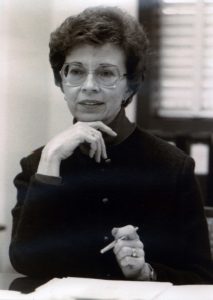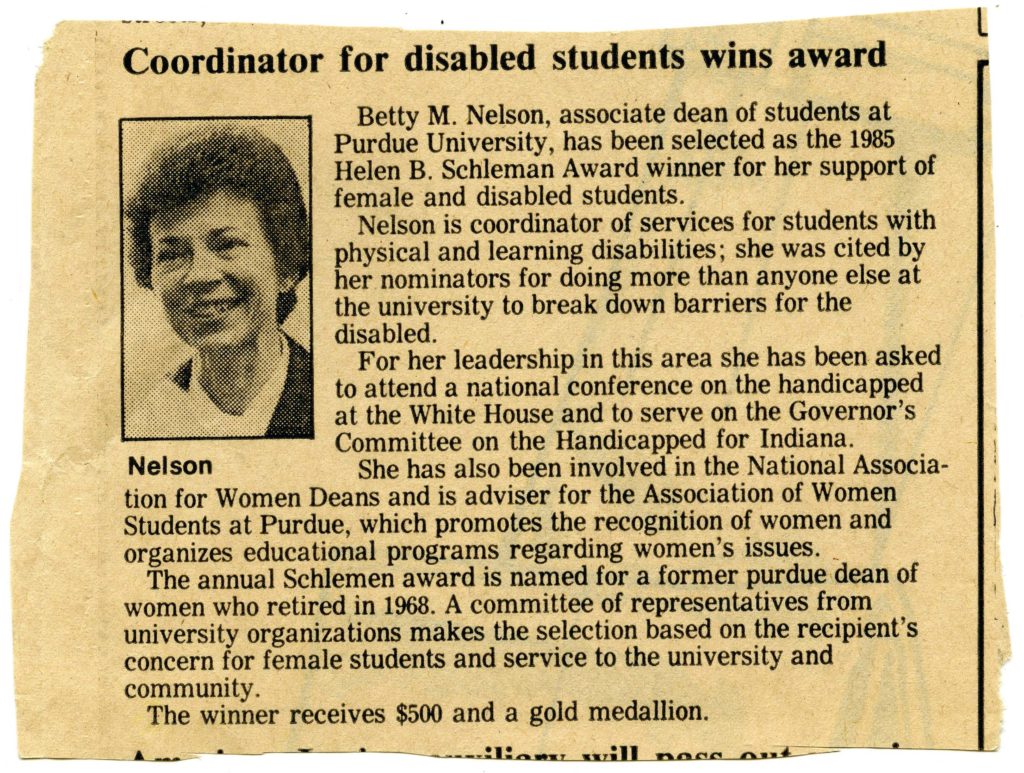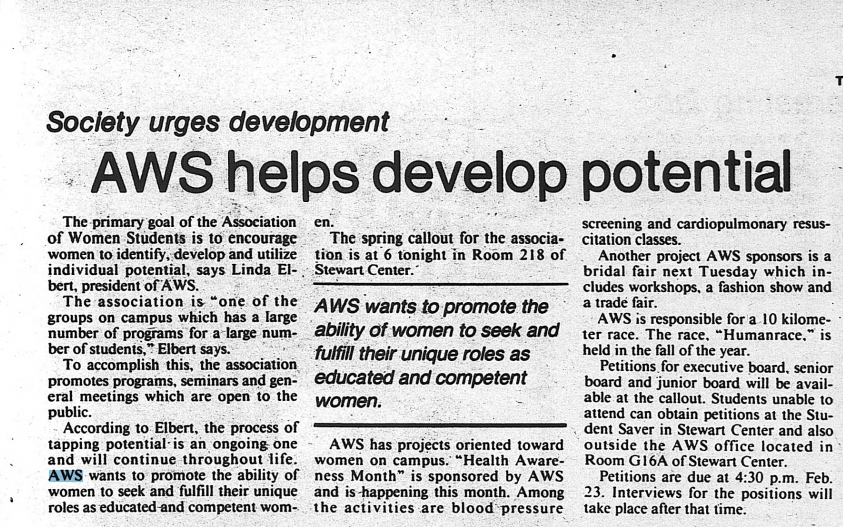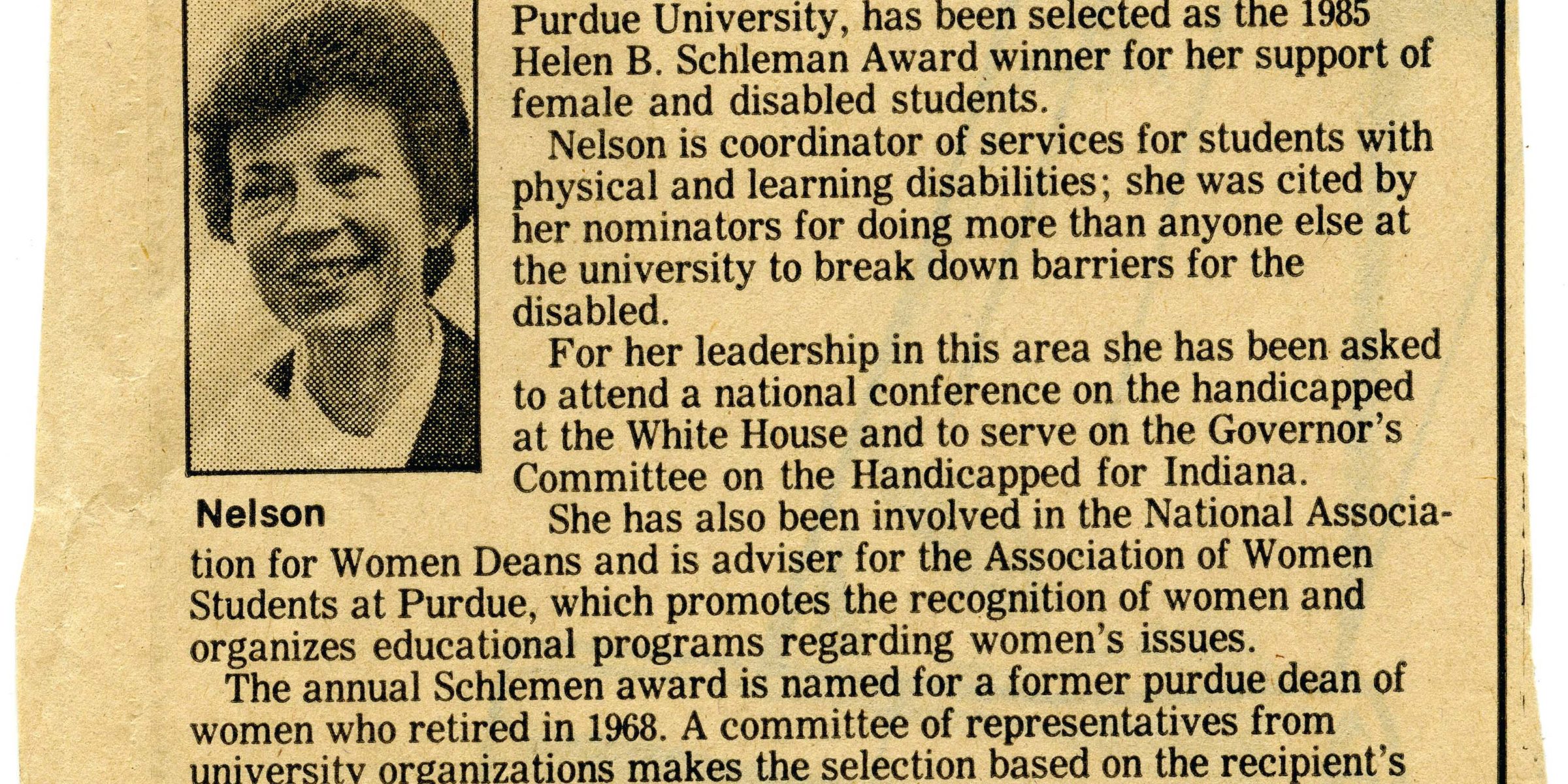Posted on November 19, 2019 by small20
Betty Nelson: A Tireless Advocate
by Anna Szolwinski
In the mid 1960s, Betty Nelson came to Purdue in search of employment. After an incidental connection with Barbara Cook, the former Dean of Students, and several recurring visits after, Betty was hired as the Director of Testing for the psychology department. This role was the first of many for Betty, as she later transitioned into the Office of the Dean of Women as Assistant and Associate Dean, and later to the Office of the Dean of Students as Dean. From the moment Betty stepped foot on Purdue’s campus, she began crafting a legacy that would carry on through generations of Boilermakers. With her compassion for others and commitment to equality, Betty walked alongside those who were marginalized, invisible, or victims of discrimination and worked tirelessly to give them a voice and respect on Purdue’s campus.
During the mid-1970s, as Assistant Dean of Students, Betty was assigned the role of improving conditions for disabled students on Purdue’s campus. The staff in the Office of the Dean of Women frequently rotated responsibilities, and although Betty had little prior experience working with the disabled, former Associate Dean, Celie Zisis, reassured Betty that “there’s not much to do in this area.” (1)
At the time Betty took on the responsibility, there were only two blind students in need of assistance. However, as Betty began to take note of the campus, she “quickly learned this would not be an easy assignment. Our Purdue history caught up with us. We had an old campus with old buildings constructed in the traditional style with steps and more steps.” (2) Betty adopted such a daunting responsibility around the same time that the Rehabilitation Act of 1973 passed, which required institutions receiving federal funding to be accessible to employees and students with disabilities. While ideal in theory, the act had no money or penalty attached, making Betty’s job even more challenging.

Fortunately, the limitations of the Rehabilitation Act were no match for Betty, and she immediately rolled up her sleeves and got to work. Over her three years in the role, Betty drastically changed not only the architectural layout of the campus, but also the attitude of faculty, staff, and students toward those with disabilities. She recruited a group of student consultants to “be the voice of accessibility” and apply their expertise to the situation. (4) The primary two locations that students wanted to frequent on campus were the Hall of Music and Mackey Arena. These campus hot spots had previously been inaccessible to handicapped students, but Betty and her team of consultants were on the job. They created accessible entrances and lifts in Mackey Arena, as well as took out seats in the Hall of Music to create room for wheelchairs and offered companion tickets for friends to accompany them.
Outside of these locations, other improvements around campus were essential. Former students Gregg Poorman and David Huxhold developed a plan to construct critical curb cuts around campus. To provide funding for this endeavor, student organizations could buy a curb cut for $250 and their name would be stamped in the concrete. As a result of the team’s creative idea, about 25 curb cuts were sponsored and built. The list of improvements Betty and her team made on campus seems to never end, and their work exceeded the expectations that had been placed upon their task. Throughout Betty’s three years in her role, she led Purdue’s efforts to improve the architectural landscape, provide sign language interpreting in the classroom, locate and schedule qualified interpreters and notetakers, locate or train oral interpreters, authorize “90” parking permits and other parking permits, refer students to the Psychological Services Center for learning disability evaluation, and publish “Removing the Barriers,” an information booklet for faculty and teaching assistants. (5)
One of the most challenging parts of Betty’s job was inspiring the Purdue and West Lafayette community to share her passion for the issue. Betty stated, “at that time, there was no mainstreaming of students with disabilities so students and faculty had never been exposed to that. There was a steep learning curve to have people work cooperatively and collaboratively.” (6) Accordingly, in the late 1970s, the group of student consultants planned an “Awareness Day,” during which 20 members of Purdue’s administration, staff, and faculty were assigned disabilities for a day. Some traveled around campus in wheelchairs, others used walkers, and the rest were blindfolded or prevented from hearing. The result of the experiment was profound, leaving some in tears. Barb Cook, Dean of Students Emerita, was deeply affected after spending Awareness Day blindfolded. Betty said, “It was traumatic for Barb. She burst into tears at the end…[She] was disoriented the whole day and feeling very, very vulnerable.” (7)
Similarly, Betty noticed that Purdue faculty and staff had a difficult time appreciating and accommodating students with learning disabilities. She stated, “If you can’t see the disability, you’re not sure if there is one.” (8) Although there were over 500 students with learning disabilities when Betty retired, Purdue administration did not respond to their needs as actively as they did for the physically handicapped. To address the discrimination, Purdue created the Adaptive Learner Program, which dramatically increased the number of students with documented learning disabilities. (9) Betty said, “we found that the more we could get students in contact with the University personnel, the more committed the staff would be to helping, and they would carry the message to others. Our employees now had a face for the students who needed modifications.” (10)
In a letter of recommendation, Barb Cook stated: “[Betty] approached this lack [of disability services] the way she approached everything she undertakes with precision, with determination, with irrefutable facts and figures. She simply whittled away in her quiet but determined way. She accomplished miracles and she did this with good spirit and in a manner in which the Purdue administration believed that they wished to make significant changes all along.” (11) With intellect and grace, Betty mobilized an entire campus not only in their physical capacity, but in their attitudinal outlook.

Equally notable during Betty’s time at Purdue was the amount of student leadership opportunities offered by the Dean of Students Office. In the 1980s and 1990s, there were between 400 and 500 recognized student organizations, which offered a myriad of leadership opportunities for students. For women, specifically, Betty ensured that there were many opportunities available. The Association of Women Students, better known as A.W.S., vowed “to promote the ability of women to seek and fulfill their unique roles as educated and competent women.” (13) In organizations like A.W.S. that were tailored for women, Betty said, “the advising and mentoring of the leaders was very strong and the staff members were very much involved.” (14) Although organizations like these later disappeared or were integrated due to Title IX, they were led by empowering influencers who gave female students the tools they needed to prosper in a world dominated by males. While women were making giant leaps on campus, Betty comically yet truthfully commented, “I don’t know what the men were doing, I think they just assumed they would be leaders.” (15)

While the male students were following a path that had already been paved, women were setting their own agendas with the help of Betty and her administration. Sister Debra A. Herrick wrote in a document regarding the history of student services at Purdue that, “Mrs. Nelson is very active on committees and feels it is important to be a visible public figure…Betty Nelson is a very involved and very visible dean. ‘Women need to be present,’ she remarked, ‘we need some representation whether we are welcome or not.’” (17) With Betty as a role model, female students were inspired to discover their place on campus and make their presence known.
As a result of her time at Purdue, Betty has deservedly won the Distinguished Service Award from the Indiana Association for Women Deans, Administrators and Counselors; the Special Boilermaker Award from the Purdue Alumni Association; and the Very Important Woman Award from Purdue’s Association for Women Students. This list is of accolades is not complete, nor does it completely capture the impact Betty made on campus. The Boilermakers attending Purdue today continue to live on Betty’s legacy and be influenced by her work. As students walk past Knoy Hall and see the marker dedicated to Betty, they are reminded not only of her contributions as Dean, but of her everlasting commitment to improving the lives of those in Greater Lafayette.
- Betty Nelson, interview by Katherine Markee, 14 March 2007, Purdue University Oral History Program Collection, Purdue University Archives and Special Collections, Purdue University Libraries.
2.Betty Nelson, interview by Katherine Markee.
3. Portrait of Betty Nelson in the early 1990s, Box 1, Folder 2, Betty Nelson Collection, Addition 3, Purdue University Archives and Special Collections, Purdue University
4.Betty Nelson, interview by Anna Szolwinski, 28 October 2019, Personal interview, Purdue University, West Lafayette, Indiana.
5. Annual Report 1988-1989, Box #1, Folder 7, Dean of Students Records, Purdue University Archives and Special Collections, Purdue University Libraries.
6. Betty Nelson, interview by Anna Szolwinski.
7. Angie, Klink, The Deans’ Bible: Five Purdue Women and Their Quest for Equality. (West Lafayette: Purdue University Press, 2014), 344.
8.Betty Nelson, interview by Anna Szolwinski.
9.Klink, Angie. The Deans’ Bible, 348.
10.Betty Nelson, interview by Katherine Markee.
11.Nomination Letter from Barbara Cook, Box 18, Folder 9, Barbara Cook Papers, Purdue University Archives and Special Collections, Purdue University Libraries.
12.Coordinator for disabled students wins award, Box 18, Folder 11, Barbara Cook Papers, Purdue University Archives and Special Collections, Purdue University Libraries.
13. “AWS helps develop potential,” The Purdue Exponent, February 16, 1983, Vol. 99, No. 28, 9.
14.Betty Nelson, interview by Anna Szolwinski.
15.Betty Nelson, interview by Anna Szolwinski.
16. “AWS helps develop potential,” The Purdue Exponent, February 16, 1983, Vol. 99, No. 28, 9.
17. A Brief History of Student Services for Women at Purdue University, Box 1, Folder 13, Betty Nelson Collection, Purdue University Archives and Special Collections, Purdue University Libraries.
